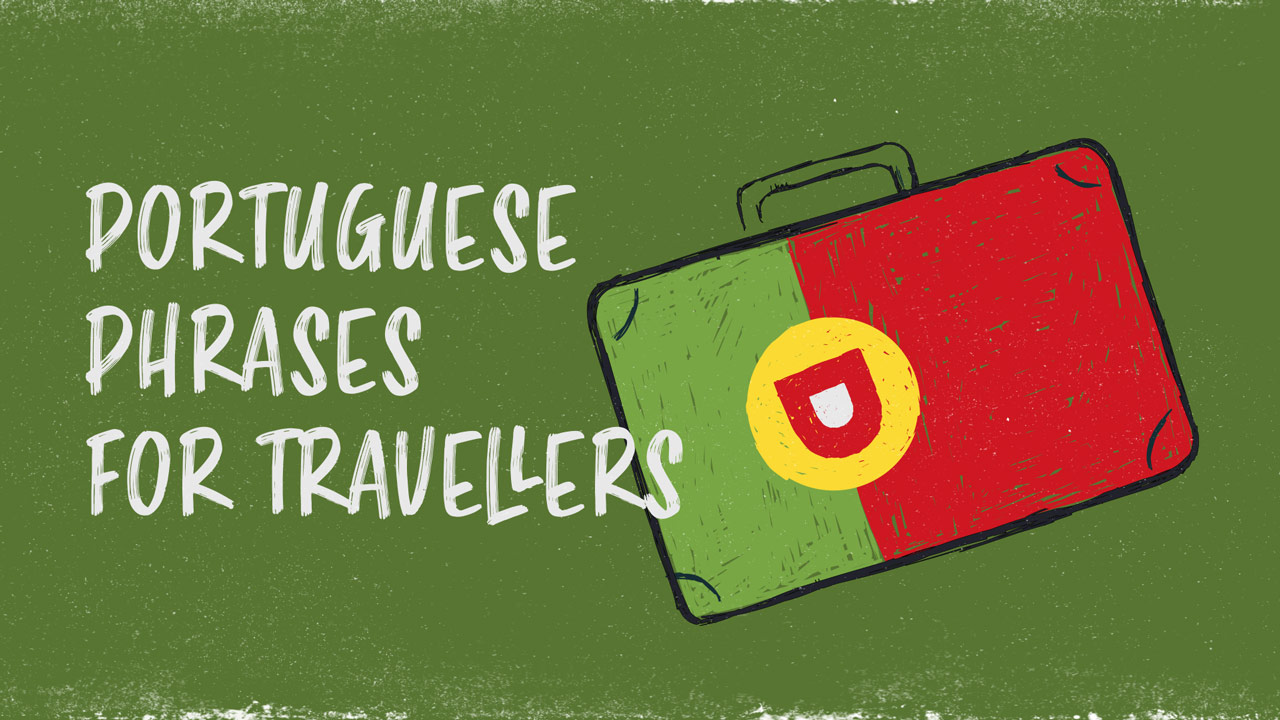20+ Basic Portuguese Phrases for Travellers and Tourists
Planning a trip to Portugal, Brazil, Cape Verde, Guinea-Bissau, Mozambique, Angola, or São Tomé and Príncipe?
Whichever Portuguese-speaking nation you want to visit, you’ll have a much richer experience if you get some basic Portuguese phrases under your belt before you board the plane.
Table of contents
- The First 9 Basic Portuguese Words and Phrases You Should Learn
- “Hello” in Portuguese – Olá/Oi
- “Excuse me” in Portuguese: Com Licença
- Greetings
- “How are you?” in Portuguese
- “Yes” in Portuguese
- “No” in Portuguese
- “Where is … ?” in Portuguese
- “Please” in Portuguese
- “Thank you” in Portuguese
- “Bye” in Portuguese
- Why Should You Learn These Portuguese Phrases?

The First 9 Basic Portuguese Words and Phrases You Should Learn
Before we jump into the detailed article, here is a rapid-fire list of words and phrases you should learn as soon as you think about having a conversation in Portuguese (which ideally is now!).
- Bom dia – “Good morning”
- Por favor – “Please”
- De nada – “You’re welcome”
- Tudo bem – “Everything is good”
- Até amanhã – “See you” (literally “until tomorrow”)
- De onde você é? – “Where are you from?”
- Como vai? – “How are you?”
- Desculpe – “Sorry” or “Forgive me”
- Tchau – “Goodbye” (informal)
If you need some motivation, take some time to listen to YouTuber Liz’s experience with learning Portuguese:
“Hello” in Portuguese – Olá/Oi
There are many different ways to greet someone in Portuguese. The most important one to know is olá, which simply means “hello”.
In Brazilian Portuguese, the word oi is very common as well. Oi is a more casual way to greet someone, like saying “hi” or “hey” in English.
Oi is not so common in Portugal.
“Excuse me” in Portuguese: Com Licença
The phrase “excuse me” serves a few different functions in English.
First of all, it can be used to get someone’s attention. A polite way to do this in Portuguese is to say com licença or simply licença.
Licença is also what you’d say if you were pushing through a crowd; it’s a polite way to ask someone to step out of your way.
“Excuse me?” can also mean “can you please repeat yourself?” In Portuguese, you can accomplish this with a como? or o que disse?
Or, if you’re in Brazil, you can use a word we’ve already seen: oi. While oi pronounced with a flat tone means “hi”, as mentioned above, you can also say it with a rising tone – oi? – to ask someone to repeat themselves.
Greetings
“Good Morning” in Portuguese: Bom Dia
Three essential phrases to know in Portuguese are bom dia, boa tarde, and boa noite, which respectively mean “good morning”, “good afternoon”, and “good night”. Which one you use depends, obviously, on the time of day.
Bom dia literally means “good day”, but you only ever use it in the morning, i.e. before midday.
Newcomers to Portuguese often struggle to pronounce bom – the masculine form of the adjective “good” – correctly. From the spelling, you’d think it was pronounced like the English word bomb, but this is dead wrong.
The -om ending actually represents a nasal vowel. This means that, instead of closing your mouth like you would for a normal “m” sound, you only say the “o”, but you let the air out through your nose as well as your mouth.
If that doesn’t make sense, don’t worry – this is a tricky thing for beginners to master. As a starting point, just pronounce bom like the English word “bong”. This is much closer to the correct pronunciation than “bomb” is.
“Good Afternoon” and “Good Night”
After midday you can’t say bom dia anymore; instead, you must use boa tarde in the place of bom dia. Then, after 6 pm, you say boa noite (“goodnight”).
“Goodnight” in English isn’t really a greeting; you’d normally only say it to someone who is about to go to bed. Boa noite can carry this meaning in Portuguese, but it can also be used as a greeting, or as a more generic way of saying “bye”.
What about “good evening”? The distinction between the “afternoon” and “evening” doesn’t exist in Portuguese. There’s only the tarde and the noite.
It’s easy to remember which one to use: between midday and 6 pm, it’s the tarde. From 6 pm onwards, it’s the noite. Simple!
“How are you?” in Portuguese
After you’ve greeted someone with an olá or bom dia, follow it up with a como vai? (“how are you?”).
You’d typically respond to como vai? with a simple bem (“well”).
Or instead of como vai? you can use tudo bem and tudo bom. Both of these expressions mean “everything (is) good”, and they can be both a question and a response.
What I mean by that is, to say “how are you?” in Portuguese, you can say tudo bem? or tudo bom? And if someone asks you either of these questions, you respond with the one that they didn’t say.
I.e. if someone asks you tudo bom?, you reply with tudo bem!. If someone asks you tudo bem?, reply with tudo bom!
“Yes” in Portuguese
“Yes” in Portuguese is sim. Like bom above, sim contains a nasal vowel. To a first approximation, it sounds like the English word “sing”.
However, in Brazilian Portuguese specifically, the word sim is almost never used. This isn’t because Brazilians are a disagreeable bunch – it’s just a quirk of their dialect. Saying sim when someone asks you a question is quite unnatural.
So what should you say instead of sim? The trick is to repeat the word from the question. It’s best illustrated by example:
- Você está com frio? – “Are you cold?”
- Estou – “I am”
- Você gostou do filme? – “Did you like the film?”
- Gostei – “I liked (it)”.
- Você fala português – “Do you speak Portuguese?”
- Falo – “I speak (it)”
It’s easy to get used to.
Note that in European Portuguese, people aren’t so shy about saying sim. You can still respond by repeating the verb in the manner above, but there’s nothing wrong with simply saying sim instead.
“No” in Portuguese
Of course, you might not always want to say sim, even in Portugal. In this case, a simple não, which means “no”, will suffice.
- Você está com frio? – “Are you cold?”
- Não – “no”
- Você gostou do filme? – “Did you like the film?”
- Não, foi uma bosta! – “No, it was crap!”
- Você fala português – “Do you speak Portuguese?”
- Não falo – “I don’t speak (it)”
- Mentira! – “Liar!”
“Where is … ?” in Portuguese
If you’re a tourist newly arrived in a Portuguese-speaking country, you might struggle to find your way around. If so, ask for directions using onde está …? – “where is … ?”
Here are a few things you might ask, and this is a good opportunity to note some of the vocabulary differences between Brazilian and European Portuguese:
- Onde está a estação de trem? – “Where is the train station?” (Brazilian Portuguese)
- Onde está a estação de comboio? – “Where is the train station?” (European Portuguese)
- Onde está o banheiro? – “Where is the bathroom?” (Brazilian Portuguese)
- Onde está a casa de banho? – “Where is the bathroom?” (European Portuguese)
- Onde está o ponto de ônibus? – “Where is the bus stop?” (Brazilian Portuguese)
- Onde está a parada de autocarro? – “Where is the bus stop?” (European Portuguese)
(Note that, due to the dominance of Brazilian media and entertainment in the Portuguese-speaking world, Portuguese people are far more familiar with brasileirismos – Brazilian words and expressions – than Brazilians are with portuguesismos.)
“Please” in Portuguese
By learning a bit of Portuguese for your travels, you’re being a little more respectful and polite than you would be by assuming that everyone you need to talk to already speaks English.
With that in mind, it’s time to learn a word that’s essential for etiquette in just about every language: “please”!
To make a sentence or request more polite in Portuguese, stick por favor – “please” – on the end.
So for example, if you’re a restaurante and you want to ask for the conta (bill), you could say this to the moço (waiter): Você pode trazer a conta, por favor?
“Thank you” in Portuguese
Now that you know how to say “please”, it’s time to learn the other essential phrase that will make your Portuguese more polite: “thank you”.
The way to say “thank you” in Portuguese depends on your gender. If you’re male, say obrigado. If you’re female, say obrigada. Often this is shortened to a simple ‘brigado or brigada.
Just like English has “thank you”, “thanks”, “cheers”, and more, there are a few different ways to thank someone in Portuguese. You can get by with obrigado/obrigada alone, but see this article for a more detailed explanation of all the alternatives.
“Bye” in Portuguese
We’ve covered “hello”. What about “goodbye”?
As in English, there are a few different ways to say “bye” in Portuguese. The most useful to know is tchau. It’s pronounced exactly like the Italian ciao, from which it’s derived.
Another way to say goodbye is adeus, which is more formal. It literally means “to God”. You may have noticed that adeus is similar to adios, the Spanish equivalent which is increasingly used these days in English. So that makes adeus easy to remember!
Why Should You Learn These Portuguese Phrases?
As I never grow tired of saying on this blog, travelling with English alone is extremely limiting. You don’t have to become fully fluent in every Portuguese dialect to have fun on a short trip to Brazil, but even a small bit of effort to learn the most common Portuguese phrases can make a big difference to your trip, and to how locals perceive you.
My favourite place to start learning a language is with a phrasebook. They’re a great way to get a basic introduction to the language and learn the most essential expressions without having to worry about grammar rules or verb conjugations or the finer points of the imperfect passive subjunctive.
But if you don’t have time to study an entire Portuguese phrasebook, start with these essential Portuguese words and expressions and you can’t go too far wrong.
And if you want to get more in-depth with Portuguese, check out my favourite resources for learning Portuguese.
I hope you enjoy your time in the Lusophone (Portuguese-speaking) world. I certainly enjoyed my time in Brazil – enough to make me visit again and again! Maybe you’ll be the same.
The above phrases won’t turn you into a fluent falante (speaker) of Portuguese, but they’re a start. I hope you have as much fun with the Portuguese language as I have.
Let me know if this post was useful to you, or which was your favourite phrase! You can message me on Instagram (@irishpolyglot), TikTok (@irishpolyglot), and Twitter (@irishpolyglot).



Social